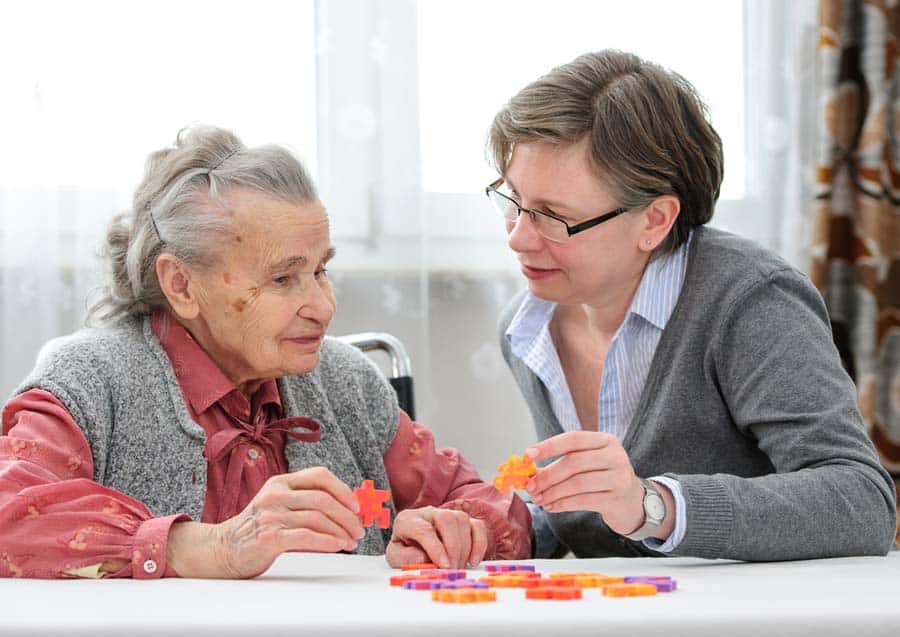Please view our updated COVID-19 guidelines and visiting procedures →.

Dementia is a complex and debilitating condition characterized by cognitive decline, memory loss, and impaired daily functioning. As the disease progresses, patients often reach an advanced stage where their functional abilities decline significantly. The Functional Assessment Staging Tool (FAST) serves as a valuable instrument for assessing and staging the progression of dementia, particularly in its advanced stages. This blog post aims to delve into the FAST, elaborate on the score needed for hospice eligibility, describe common characteristics of end-stage dementia, and touch upon different types of dementia and highlight how the decline can vary among these types.
The Functional Assessment Staging Tool (FAST) is a widely recognized and validated instrument used to assess the functional abilities of individuals with dementia. It was developed by Barry Reisberg, MD, and his colleagues in the late 1980s to provide a structured framework for staging the progression of Alzheimer’s dementia based on functional impairment. The FAST consists of seven stages, each representing a distinct level of cognitive and functional decline.
| FAST Score | Dementia Stage | Description |
|---|---|---|
| Stage 1 | No Cognitive Decline | Normal cognitive function and memory. No observable symptoms of dementia. |
| Stage 2 | Very Mild Cognitive Decline | Slight cognitive changes attributed to aging. Forgetfulness and mild difficulty finding words. |
| Stage 3 | Mild Cognitive Decline | Noticeable cognitive impairment. Frequent memory lapses. Challenges in work or social settings. |
| Stage 4 | Moderate Cognitive Decline | More pronounced cognitive deficits. Intensified memory loss, reduced problem-solving, and attention. |
| Stage 5 | Moderately Severe Cognitive Decline | Significant cognitive and functional deficits. Memory deterioration, confusion about time/place. |
| Stage 6 | Severe Cognitive Decline | Profound cognitive impairment. Difficulty recognizing loved ones, memory loss, personality changes. |
| Stage 7 | Very Severe Cognitive Decline (Subclassification A-F) | Total functional dependence. Challenges in mobility, communication, and basic tasks. |
| 7A | Speaks 5-6 words during the day | Limited verbal communication ability. |
| 7B | Speaks only 1 word clearly | Severely restricted verbal communication. |
| 7C | No longer can walk without assistance | Mobility challenges, walking assistance required. |
| 7D | Can no longer sit up | Inability to sit up unassisted. |
| 7E | Can no longer smile | Loss of ability to smile. |
| 7F | Can no longer hold their head up | Inability to hold head up without assistance. |
The FAST score assists healthcare professionals, caregivers, and families in assessing the level of cognitive and functional decline, enabling them to provide appropriate care and support tailored to each stage. By understanding the implications of each stage, individuals can ensure the best quality of life for those living with Alzheimer’s dementia while navigating the challenges that arise throughout its progression. It's important to note that while the FAST provides a structured framework for understanding Alzheimer’s dementia progression, the exact experience can vary among individuals. Additionally, the rate at which individuals progress through the stages may differ based on factors such as the type of dementia, overall health, and individual characteristics.

Hospice care is a specialized form of medical care aimed at providing comfort, support, and quality of life for individuals with life-limiting illnesses, including advanced dementia and neurocognitive disorders. Determining hospice eligibility involves a comprehensive assessment of the patient's medical condition, functional status, and prognosis. The Functional Assessment Staging Tool (FAST) score, along with Medicare's Local Coverage Determination (LCD) for dementia and neurocognitive disorders, plays a significant role in determining hospice eligibility for individuals with these conditions. Generally, a FAST score of 7A or higher is considered indicative of end-stage dementia, indicating that the individual's cognitive and functional impairments have reached a point where specialized end-of-life care is necessary.
Individuals with a FAST score of 7A or higher often require assistance with most, if not all, activities of daily living (ADLs). These activities may include eating, dressing, bathing, toileting, and mobility. Additionally, they may experience communication challenges, memory loss, and an overall decline in cognitive abilities. The FAST score helps healthcare professionals, caregivers, and families make informed decisions regarding the appropriate level of care, including hospice services, to ensure the individual's comfort and well-being.
Medicare, the federal health insurance program in the United States, covers hospice services for eligible beneficiaries. Medicare's Local Coverage Determination (LCD) provides guidelines for determining hospice eligibility based on the specific medical condition, prognosis, and functional status of the individual. For individuals with dementia and neurocognitive disorders, the LCD outlines the criteria that need to be met for hospice coverage.
The LCD typically includes criteria related to cognitive impairment, functional decline, and the overall trajectory of the disease. It may require documentation of a qualifying FAST score, indicating the individual's advanced stage of dementia. Additionally, the LCD may consider other factors such as recurrent infections, declining nutritional status, and overall decline in medical condition. Meeting these criteria ensures that individuals receive the appropriate level of care, focusing on comfort and symptom management.

Dementia is an umbrella term that encompasses several types of neurodegenerative disorders, each with its unique characteristics, underlying causes, and progression patterns. Understanding these different types of dementia is necessary for providing appropriate care and support to individuals affected by the condition. Let's delve into the various types of dementia and their distinct features:
Each type of dementia presents its unique challenges and progression patterns. Understanding the differences is crucial for accurate diagnosis, effective management, and tailored care plans. Healthcare professionals, caregivers, and families must be knowledgeable about these variations to provide the best possible support and enhance the quality of life for individuals affected by dementia. Early diagnosis, appropriate interventions, and compassionate care play vital roles in improving the well-being of those living with dementia and their loved ones.
In the realm of dementia care, hospice services emerge as a beacon of compassion and comfort, providing a sanctuary for individuals navigating the challenging journey of advanced dementia. Hospice care becomes an essential companion during this critical phase, offering specialized support that enhances both the quality of life of patients and the emotional well-being of their loved ones. As individuals with advanced dementia face the formidable decline in cognitive and functional abilities, hospice steps in to offer solace, dignity, and a comprehensive approach to care that is as empathetic as it is effective.
For patients with advanced dementia, hospice services serve as a lifeline, offering tailored care that focuses on pain management, symptom relief, and emotional well-being. Hospice professionals possess a deep understanding of the nuanced needs of individuals in end-stage dementia, providing expert guidance to alleviate discomfort, anxiety, and distress. Through carefully designed interventions, hospice services enhance patients' comfort, fostering an environment of tranquility that nurtures their dignity and humanity. The holistic care approach encompasses not only the physical aspects of care but also addresses the emotional and psychological well-being of both patients and their families.

Loved ones of individuals with end-stage dementia can find solace in the embrace of hospice care, as it offers not only practical support but also a compassionate presence during this profoundly challenging period. Hospice teams work closely with families, helping them navigate the complexities of dementia care, offering respite, education, and emotional guidance. Family members can expect a multidisciplinary team that includes nurses, doctors, social workers, counselors, and volunteers, all dedicated to creating a nurturing environment that preserves the dignity and comfort of the patient. As the progression of dementia can be emotionally demanding for families, hospice also provides much-needed psychological support, helping loved ones cope with grief and make the most of the time they have left with their cherished family member.

In the realm of dementia care, hospice services shine as a beacon of compassion and empathy. Through their expertise, dedication, and unwavering commitment, hospice professionals offer patients with advanced dementia the opportunity to transition with grace, comfort, and respect. Families can expect not only comprehensive care for their loved ones but also a support system that holds their hands through the challenges of end-stage dementia. In the final chapter of the dementia journey, hospice care becomes a testament to the power of human connection and compassion, reminding us that even in the face of decline, every individual's story deserves to be honored and cherished.

As a not-for-profit, we depend on generous donors to help us provide customized services and therapies that aren’t completely covered by Medicaid, Medicare, or private insurance.
Please make a gift to help us sustain the highest standard of care.
Admissions may be scheduled seven days a week.
Call our Centralized Intake Department: (203) 315-7540.